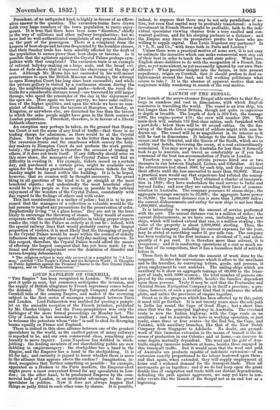LAUNCH OF THE BENGAL.
THE launch of the screw-steamer Bengal adds another to that flee', large in numbers and vast in dimensions, with which Enesh commerce is travelling the world. The vessel is an iron ship, ten feet longer than the Great Britain, though not quite so capacious in depth or breadth. The length of deck is 310 feet, the tonnage 2300, the engine-power 470 ; the crew will number 200. ge The main-deck will contain 135 first-class cabins, each furnished with a port-hole ; below there will be 40 second cabins. On the fine sweep of the flush deck a regiment of soldiers might with ease be drawn up. The vessel will be as magnificent in its interior as it will be vast in dimensions. It belongs to the class like the Pre- cursor, and the Oriental, and the Queen of the South, which are in reality vast hotels, traversing the ocean, at a cost extraordinarily economical. You may now go to Australia for less than it formerly took to go to America, and travel as comfortably as if you had command of the best inn-accommodation of Paris or London.
Fourteen years ago, a few private persons hired one or two steamers to run between England, Lisbon, and Gibraltar. At first the adventurers lost about 5001. by each trip, and they continued their efforts until the loss amounted to more than 30,0001. Many a practical man would say that experience had refuted the concep- tion; still they persevered. They obtained a charter of incorpora- tion in 1840; they have undertaken the mail service to India and beyond India; and now they are extending their lines of commu- nication to Australia. The company possesses 41 steam-ships ; the aggregate tonnage amounts to 52,000 ; the aggregate horse-power to 16,000; the annual distance run is more than 1,000,000 miles; the current disbursements and outlay for new ships is not less tha 1,000,000/. sterling.
It is interesting to compare the amount of service performed with the cost. The annual distance run is a million of miles ; the current disbursements, as we have seen, including outlay for new ships, which will indeed extend that run, is a million sterling ; the value of the property is about 2,000,000/. sterling. Thus, the plant of the company, including its current expenses for the year, may be stated at something under 3/. per mile run. The company has been realizing in the first instance a dividend of 7, and subse- quently of 8 per cent. It is therefore more than solvent, it is prosperous ; and it is conducting operations at a cost so much un- der that of its competitors, that it has a boundless field of activity before it.
These facts do but half show the amount of work done by the company. Besides the convenience which it offers to the merchant and to the traveller, in conveying letters, goods, and persons, it gives employment to vast numbers. The sailing-ships which are auxiliary to it show an aggregate tonnage of 60,000 in the trans- port of coals, with 3000 seamen ; the total number of persons em- ployed by the company is 100,000, besides the families dependent upon those persons. Truly it may be said that the Peninsular and Oriental Steam Navigation Company is in itself a province ; a pro- vince, however, of such a peculiar kind that it embraces the whole globe, and unites the provinces of empire together. Great as is the progress which has been effected up to this point, it must still go further. It is not twenty years since the sole path to India lay round the Cape of Good Hope ; but a short time since that was the principal highway to Australia. The overland route is now the Indian highway, with the Cape route as an auxiliary ; and to Australia we have in working operation, or just ready, some three or four routes—by the Bed Sea, the Cape, and Panama, with auxiliary branches, like that of the New Dutch Company from Singapore to Adelaide. No doubt, one ground- work of this immense extension in the means of transit is the in- crease of production in our Colonies and at home,—an increase in some degree mutually dependent. The wool and the gold of Aus- tralia employ immense numbers at home, besides those engaged in this transport traffic. But it would seem that the wool and gold of Australia are products capable of indefinite extension—of an extension exactly proportioned to the labour bestowed upon them ; and that again, when extended, they will supply employment at home and a widened demand for the transport-trade. Thus all movements go on together; and if we do but keep open the great double line of emigration and trade with our distant dependencies, defending the path against aggressors, we may yet have to con- sider events like the launch of the Bengal not as an end but as a beginning.


























 Previous page
Previous page